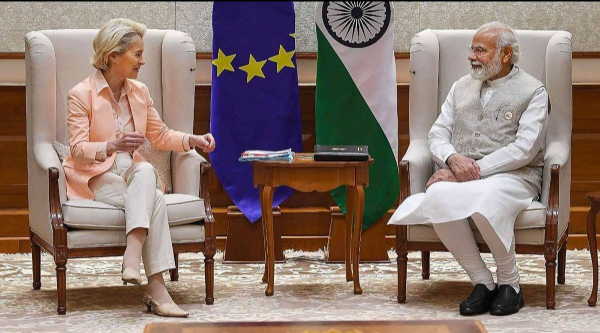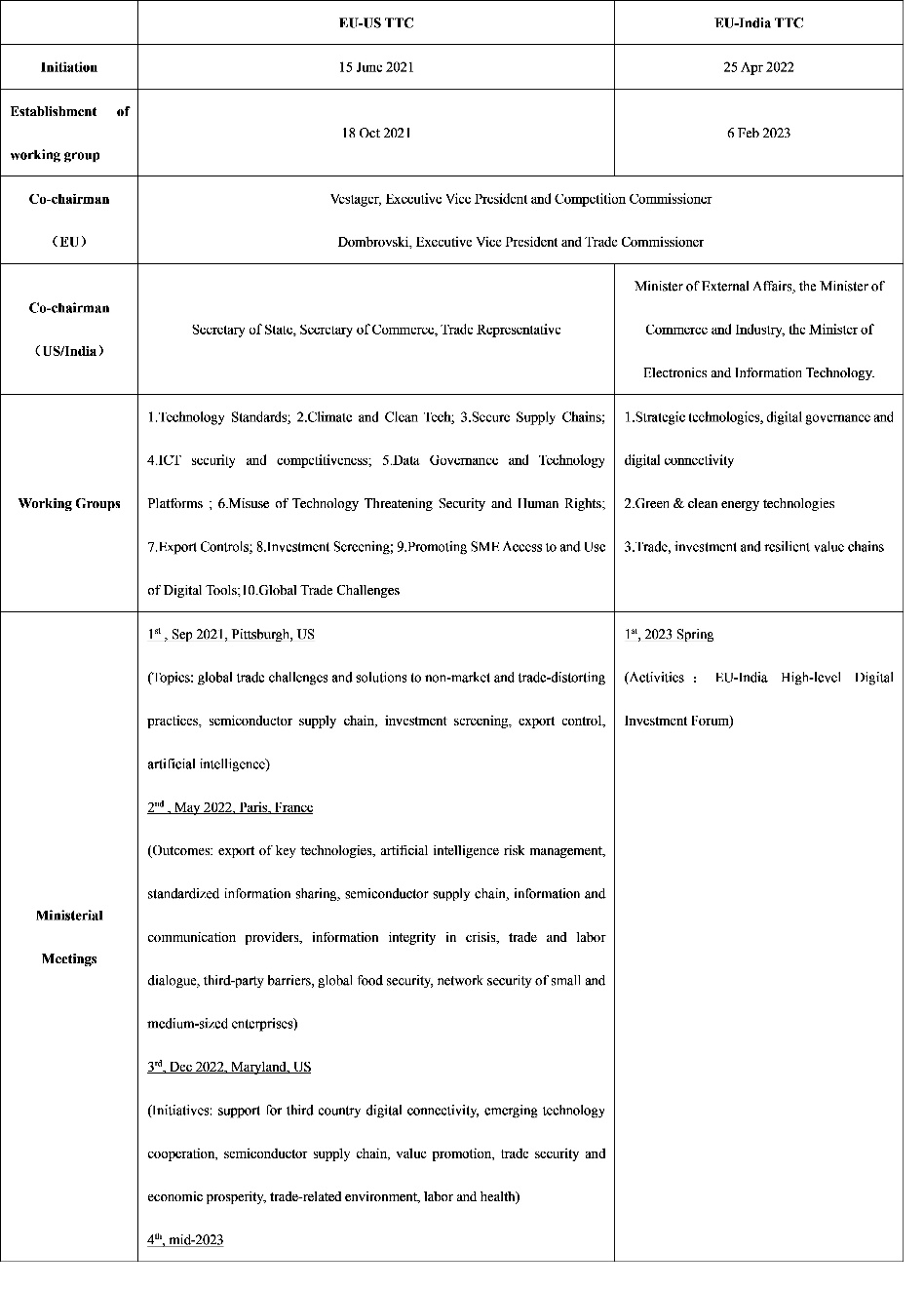The CCCEU Weekly Update 10 February 2023: EU launches TTC with India after similar forum with the US

EU launches TTC with India after similar forum with the US
Editor's Note: Greetings from sunny but chilly Brussels! With Ukrainian President Zelensky's visit to Brussels, the EU summit, and the EP plenary, there is a lot to follow in the EU bubble. In addition, your editor reckons that the launch of the EU-India TTC, the EU's second such forum following the one with the U.S., is of interest to the business community. This edition of the CCCEU Weekly Update keeps you in the know of key EU economic and trade policies. Enjoy reading and have a lovely weekend.
The EU-India Trade and Technology Council (TTC) was officially established on February 6. India has become the second country to jointly establish TTC with the EU after the US.
The Council was proposed by von der Leyen, President of the European Commission, and Modi, Prime Minister of India, when they met in New Delhi in April last year. It is proposed to provide political steer and necessary structures to coordinate approaches and advance technical work, which reveals its geopolitical consideration.
The European Commission also stated that "the EU and India have a common interest in ensuring security, prosperity, and sustainable development based on shared values."
Since last year, the EU has repeatedly shown good intentions towards India and intends to strengthen its partnership with that country. In addition to the joint establishment of the TTC, the EU relaunched the free trade agreement negotiations with India that had been suspended for eight years in June last year, launched the negotiations on the bilateral investment protection agreement and the geographical indication agreement, and initiated the Trade Sustainability Impact Assessment on India-EU trade.
The above agreements focus on market access and fair competition clauses, while TTC is deeply involved in technical policy coordination in critical industries.
The EU-India TTC plans to hold at least one ministerial meeting every year, and the first meeting will take place this spring. The EU side is co-chaired by Ms. Vestager, Executive Vice President and Competition Commissioner, and Mr. Dombrovski, Executive Vice President and Trade Commissioner, while the Indian side is co-chaired by the Minister of External Affairs, the Minister of Commerce and Industry, and the Minister of Electronics and Information Technology.
The Ministerial Conference has three joint working groups. The first working group focuses on information technology and will carry out cooperation in areas of mutual interest, such as digital connectivity, artificial intelligence, 5G and 6G, high-performance and quantum computing, semiconductors, cloud systems, cybersecurity, digital skills, and digital platforms.
The second working group focuses on green and clean energy technologies and will promote bilateral cooperation among incubators, start-ups, and SMEs through research and innovation on investment and standards in clean energy, the circular economy, waste management, plastics, and litter in the ocean.
The third working group focuses on the supply chain and will be committed to building a resilient supply chain and acquiring critical components, energy, and raw materials. It will also work to solve trade barriers and challenges and address global geopolitical challenges by promoting multilateral cooperation.
The first two working groups are, needless to say, based on "A European Green Deal" and "A Europe fit for the digital age," among the six priorities of the EU's 2019–2024 work plan. In contrast, the third working group is quite thought-provoking, and recall that von der Leyen pointed out the EU's upstream dependence on China in the field of rare earths, lithium, and other critical raw materials at the Davos Forum this year and proposed to strengthen supply chain cooperation with "like-minded" partners through the Net-Zero Industry Act and the Critical Raw Materials Act.
In fact, the EU-India TTC is also part of the EU's Indo-Pacific Strategy. Since May last year, the EU has intensively established digital partnerships with Japan, South Korea, and Singapore under this strategy. It seems that geopolitics and value politics have gradually become important considerations for the EU's leading supply chain, and the intervention of critical industries has been extended from the EU's internal market to external regions.
Before the EU-India TTC, the EU established the TTC with the US in 2021. So far, three ministerial meetings have been held and 10 joint working groups have been set up.
It can be seen that the issues of EU-US TTC are richer and deeper, far beyond the scope of trade or technology in the general sense. In contrast, although the EU intends to access the Indian market and India also hopes to seize the technology spillover from the EU and supply chain transfer worldwide, considering that India is only the tenth largest trading partner of the EU and there is a large gap between the two sides in technology level and market environment, it is expected that the EU-India TTC will still focus on barrier reduction, market access, and technical cooperation in critical industries, and it is difficult to build a deeper community of interests.
The following table compares the two TTCs.

West implements price caps on Russian oil products as Moscow vows to safeguard interests
According to Xinhua, the implementation of further price caps for seaborne Russian petroleum products, adopted Saturday by the European Union (EU) and the Group of Seven, began Sunday, despite Russia's vow to take measures to protect its interests.
The price cap for "premium-to-crude" petroleum products, such as diesel, kerosene, and gasoline, is set at 100 U.S. dollars per barrel, while the cap for "discount-to-crude" petroleum products, such as fuel oil and naphtha, is set at 45 dollars per barrel, the European Commission said in a press release.
EU will propose the 10th package of sanctions against Russia
According to Xinhua, the EU will propose the 10th package of sanctions against Russia in the coming days, which will include additional export bans worth more than 10 billion euros.
EU lawmakers aim for common position on draft AI rules by early March
According to Reuters, EU lawmakers hope to agree on draft artificial intelligence rules next month, with the aim of clinching a deal with EU countries by the end of the year, one of the legislators steering the AI Act said.
The European Commission proposed the AI rules in 2021 in an attempt to foster innovation and set a global standard for a technology, used in everything from self-driving cars and chatbots to automated factories, currently led by China and the United States.
China-US trade defies talk of decoupling to hit record high in 2022
According to CNN, trade between the United States and China hit a record high in 2022, even as political tension heightened between the world's top two economies.
The bilateral goods trade between the countries rose to $690.6 billion last year, according to official US data, which was released Tuesday.
Exports to China increased by $2.4 billion to $153.8 billion, while imports of Chinese products rose by $31.8 billion to $536.8 billion, according to the US Bureau of Economic Analysis.
Zelensky speaks to the EU Parliament in Brussels and meets the King of Belgium
The Belgian capital was the third stop on Zelensky's whirlwind tour of Europe.
Zelensky then travelled with Macron to Brussels on Thursday, where he delivered a speech to European lawmakers and later addressed all 27 leaders of the EU member states' special summit. It was Zelensky's first official visit to the European Parliament (EP) after having addressed its members remotely during an extraordinary session on March 1, 2022.
Addressing the EP, Zelensky said that "a Ukraine that is winning is going to be a member of the European Union."
He then met Belgium's King Philippe late Thursday after attending the EU summit and meeting European leaders.
Key EU committee approves ETS, CBAM carbon reforms
The European Parliament's Committee on Environment, Public Health, and Food Safety (ENVI) voted Feb. 9 in favour of the EU's revised Emissions Trading System, which includes major carbon market reforms, pushing the bill closer to formal adoption.
European carbon prices observed sharp gains immediately after the approval by ENVI of these key reforms.
"By confirming that a price has been paid for the embedded carbon emissions generated in the production of certain goods imported into the EU, the CBAM will ensure the carbon price of imports is equivalent to the carbon price of domestic production, and that the EU's climate objectives are not undermined," according to the European Commission.
What are experts talking about?
"Croatia's 'Return to Europe'" was written by Kong Tianping, Researcher, Institute of European Studies, Chinese Academy of Social Sciences. The article takes Croatia's accession to the Eurozone and the Schengen Area as an example, introduces the advantages and disadvantages of joining the Eurozone and the Schengen Area, and analyses the accession as a major step forward in Croatia's efforts to integrate into Europe from the perspective of European integration.
"Preparing for the next winter: Europe's gas outlook for 2023" published by Bruegel, the authors are Ben McWilliams, Simone Tagliapietra, Georg Zachmann and Thierry Deschuyteneer. The policy brief concludes that in order to achieve the EU's goal of extending its demand reduction, policy should support a continued structural shift away from gas. This involves enabling rapid deployment of renewables and the accompanying grid infrastructure, energy-efficiency measures, help for households that want to switch to cleaner heating, and collaboration with industry to accelerate the adoption of new low-carbon production methods.
Please note: the English version of this issue is slightly different from our Chinese one. The views and opinions expressed in this article do not necessarily reflect the official position of the CCCEU.

 Login
Login Login
Login CCCEU and Gunnercooke Successfully Host Webinar on CSDDD and FLR Compliance to Guide Chinese Businesses
CCCEU and Gunnercooke Successfully Host Webinar on CSDDD and FLR Compliance to Guide Chinese Businesses Cultivating responsible China-EU business leaders essential to tackling global challenges
Cultivating responsible China-EU business leaders essential to tackling global challenges



